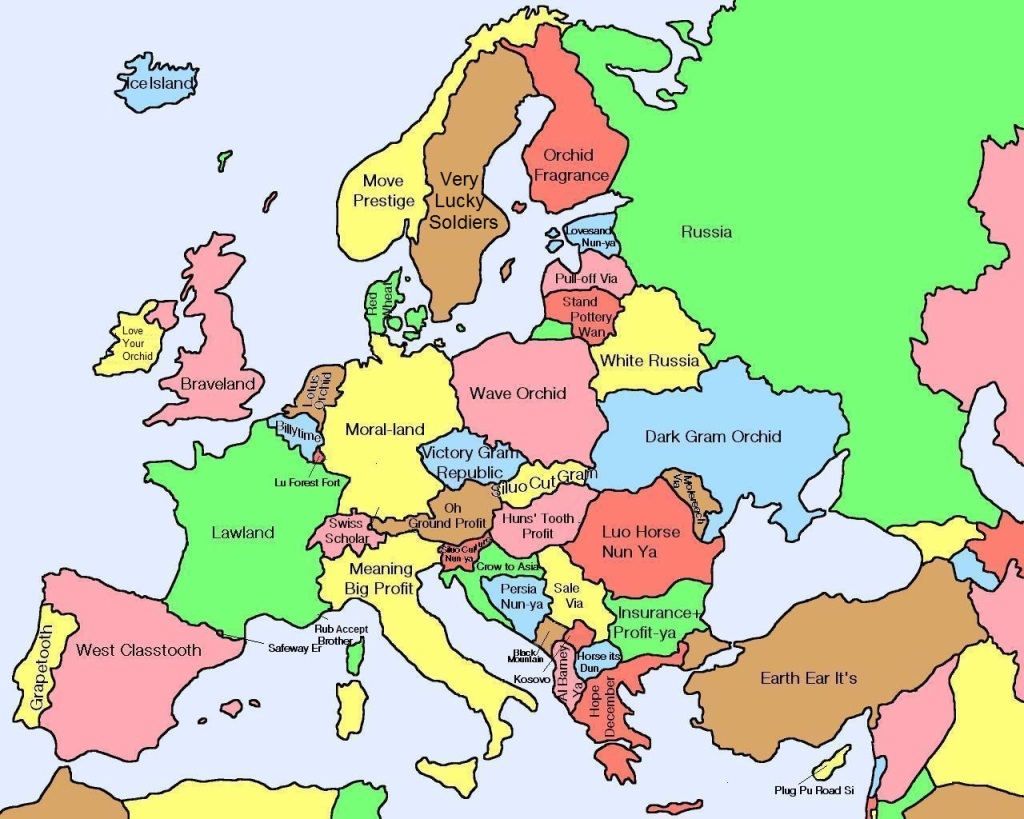Monday Map showing how the name of European nations, when translated literally from Chinese, according to Haohao Report, can be rather amusing.

What’s In A Name?
Some leeway has been taken here, since certain Chinese characters can have more than one meaning, depending upon usage and dialect. Also, when naming countries for maps, the Chinese would often choose characters that sounded close to the syllables used to pronounce the official name of the country in question. For example the official name of Spain is España, which in Chinese became Xi Ban Ya, or “West Class Tooth.”
This brought to mind a question I have posed for many years, why don’t we call Germany Deutschland and a German Deutsch?
A German by any other name would be as Deutsch
I know why we call Germany Germany; it comes from the Latin germanicus, which was used to describe the tribes in that part of the world during the Roman Empire.
That is not a very satisfying answer, considering we have had a thousand years to figure out what a place is actually called. It has been 200 years since Deutsch was offered to the world as the official term of national identification. But we keep right on with this German nonsense.
Sometime around Nixon’s visit to China we were suddenly asked to start calling Peking by its more accurate pronunciation of Beijing. In less than 20 years it became second nature to use the correct name. Why can’t we do the same with Deutschland? After all, we call Finland Finland.
But then, its name isn’t Finland, is it? It is Suomi.
It just seems arrogant to me, or at least rather lazy in this information age to expect a Svenska person from Sverige to come to America and continually say “I am Swedish from Sweden.”
I understand that certain languages make it rather difficult to master the actual name of well-known countries. But many of the names we use are no less absurd than those on the map above. However, if we followed the Peking to Beijing model, with schoolchildren taught the proper names at an early age, reenforced by the New York Times and other sources of record, it probably wouldn’t take all that long to adjust to calling our friends and neighbors on the planet by their actual names, instead of “You from that place I don’t know how to pronounce.”
Here are the names of European lands, according to themselves. Some use symbols and characters we do not. Sometimes their spelling actually sounds like ours. But in many cases we come nowhere near the mark.
English Name – Local Name (different alphabet) [pronunciation]
Albania – Shqipëria [Ship-per-EE-ya ]
Andorra – Andorra
Austria – Österreich
Azerbaijan – Azərbaycan
Belarus – Biełaruś
Belgium – België
Bosnia and Herzegovina – Bosna i Hercegovina
Bulgaria – Bŭlgarija
Croatia – Hrvatska
Czech Republic – Česko
Denmark – Danmark
England – England
Estonia – Eesti
Finland – Suomi
France – France
Germany – Deutschland
Greece – (Elláda)
Hungary – Magyarország
Iceland – Ísland
Ireland – Éire
Italy – Italia
Latvia – Latvija
Liechtenstein – Liechtenstein
Lithuania – Lietuva
Luxemburg – Luxembourg
Macedonia – (Makedonija)
Moldova – (Moldova)
Monaco – Monaco
Montenegro – (Crna Gora)
Netherlands – Nederland
Norway – Norge
Poland – Polska
Portugal – Portugal
Romania – România
Russia – (Rossiya)
San Marino – San Marino
Serbia – (Srbija)
Scotland – Scotland – the Scots name, Alba is the Gaelic term
Slovakia – Slovensko
Slovenia – Slovenija
Spain – España
Sweden – Sverige
Switzerland – Helvetica – official name that avoids favoring one language over others.
Turkey – Türkiye
Ukraine – (Ukrajina)
Wales – Cymru [KEM reh]